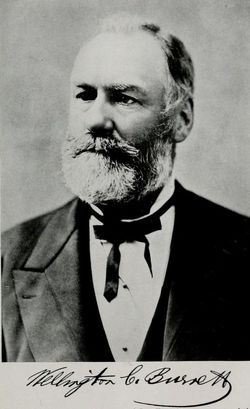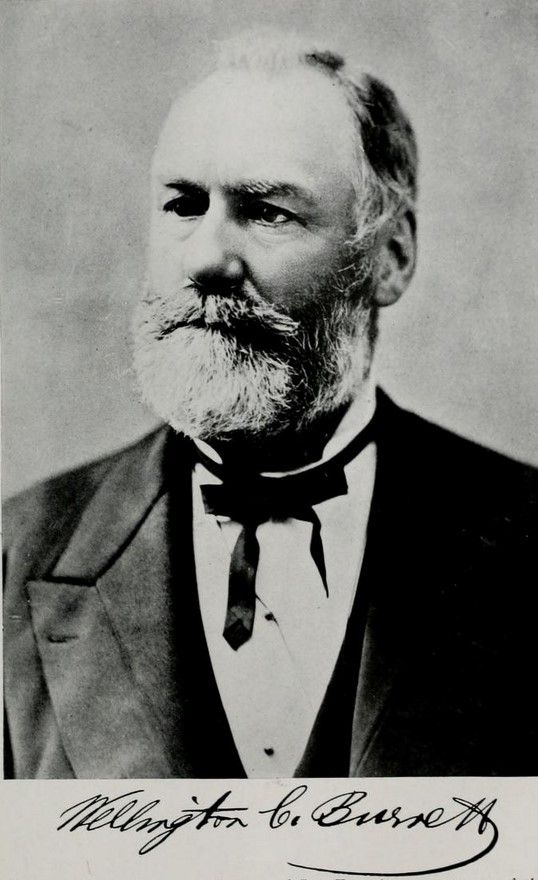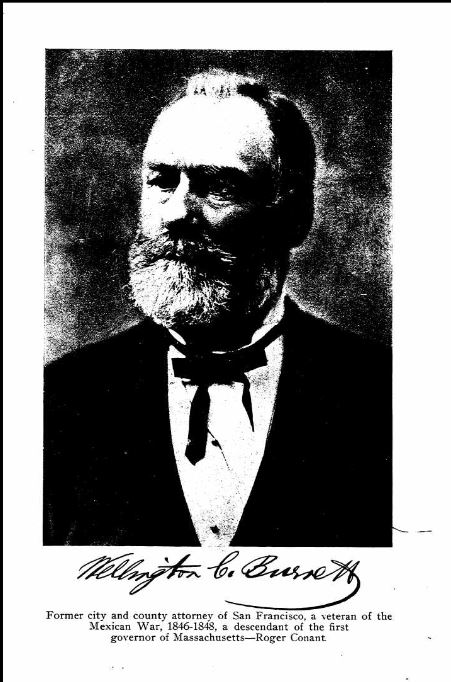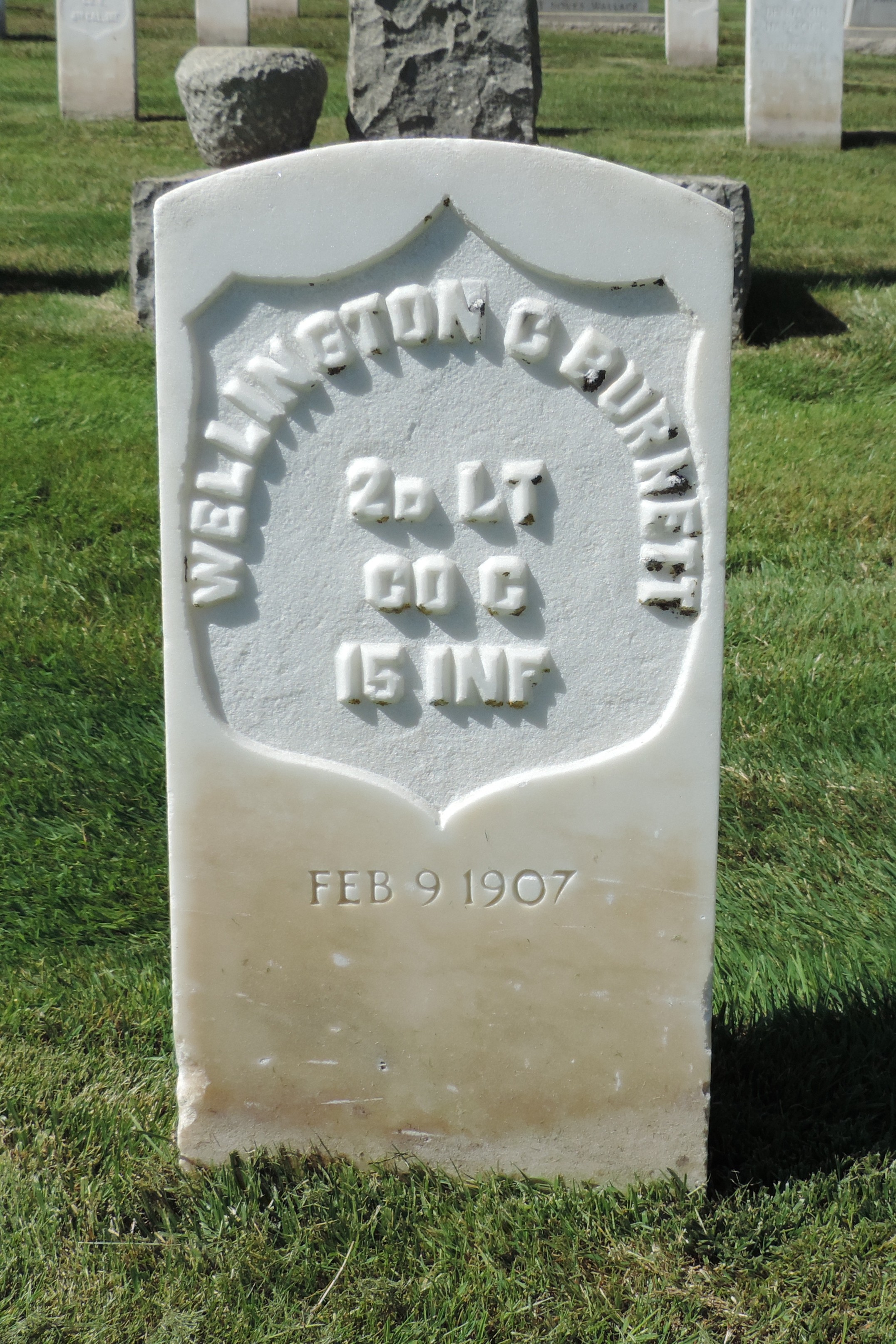~~~
San Francisco Call, Volume 101, Number 74, February 12, 1907, pg 15, col 3: "Burnett — In this city, February 9, 1907, Wellington Cleveland Burnett, beloved husband of Jane Cleveland Burnett, and father of Isaac, Lester, Marius, Olive and Gertrude Burnett, a native of Hampton, Windham County, Conn, aged 78 years 4 months and 19 days.
"Friends are respectfully invited to attend the funeral, at his late residence, 1022 Broadway, between Octavia and Laguna streets, tomorrow (Wednesday), February 13, at 2 o'clock p.m. Interment National Cemetery, Presidio. Associated Veterans of the Mexican War are particularly requested to attend."
~~~
San Francisco Call, Volume 101, Number 119, March 29, 1907: "Honor for Dead Comrade. The Veterans of the Mexican War passed resolutions of condolence, at a recent meeting, for the death on February 9 of their former comrade, and president, Wellington Cleveland Burnett. He was 79 years old, had served in the defense of his country and was a member of the Judiciary and was honored and respected by all who knew him."
Other information: California State Roster, 1911 Government and Military records - Original data: California Blue Book or State Roster 1911. Sacramento, CA, USA: State Printing Office, 1911.
~~~
The San Francisco Bay Region, Vol. 3 by Bailey Millard; Published by The American Historical Society, Inc. 1924: Wellington Cleveland Burnett was a California pioneer who won distinction in the legal profession and as a public official and leader in popular sentiment and action. He was one of the foremost members of the San Francisco bar at the time of his death, February 9, 1907. He had given service as a young soldier in the Mexican war, 1846-1848 and in connection with military affairs in California, served as brigadier-general of a veteran of the Mexican War, 1846-1848, the California National Guard under the administration of Governor William Neely Johnson.
General Burnett was born at Hampton, Windham County, Connecticut, on September 21, 1829, being the older son of Capt. Lester Burnett, born in Hampton, Connecticut, October 29, 1804, and Olive Browne Cleveland, his wife, born at Brooklyn, Connecticut, October 13, 1809. He was of Colonial stock. His grandfather, James Burnett, of Canterbury, Connecticut, was a soldier of the American Revolution and was one of the Minute Men at Bunker Hill. The first lineal ancestor of the subject of this memoir of the name of Burnett to come to this country was Robert Burnett, who sailed from England and was landed at Lynn, Massachusetts, was in Roxbury 1642 and then at Reading, Massachusetts, where he was an original settler.
On the maternal side General Burnett was a direct descendant of Stephen Hopkins, Gent., the fourteenth signer of the Mayflower Compact and on the paternal side, through the female lines, of Governor Roger Conant, the first Colonial governor of Massachusetts. Governor Conant was governor under the Dorchester Planters and was superceded in office by John Endicott of the Massachusetts Bay, who was sent out for the express purpose of superceding him. Records of these early political antagonisms may be found in the Massachusetts Civil List and in Felt's Annals of Salem and Young's Chronicles.
Through the Brownes, Colonial councillors and assistants, Burnett was a lineal descendant of Louis VIII, King of France, through a long line of French, English and Scotch ancestors, including the Fitz-Alans.
Capt. Lester Burnett moved with his family to Michigan when the subject of this memoir was a boy of thirteen, and he was a farmer in that state shorty after it was admitted to the Union and was a notary public. His brother, Ellsworth, an early settler in the Middle West, was murdered there by Indians.
Capt. Lester Burnett was a pioneer of 1850 in California, he having come overland by the Chagras Route, arriving in San Francisco on New Year's Day of that year. Thence he made his way up to Long Bar, Yuba County, where he became an orchardist and owned the right to the headwaters of Dry Creek, selling the water to the miners at so much an inch. He was president of the Eureka Mining Company and president of the water company of which B.B. Redding, afterwards of San Francisco, was the secretary. Placer mining was successfully operated on his land, and under the house which he there built and occupied a gold mine was later discovered, but not until after his death in September. 1870.
After the removal of the family to Michigan, Wellington Burnett attended the common schools in that locality, Highland, Michigan. He was about seventeen years old when the Mexican war, 1846-1848, was initiated, and his patriotism and youthful spirit of adventure led him to run away from home and make his way to Dayton, Ohio, where he enlisted in the Regular Army of the United States. He continued in active service until the close of the war with Mexico, took part in five battles of the line and minor engagements, was at the storming of Vera Cruz and the taking of the Castle of Chapultepec and the triumphal entry into the City of Mexico on the following day.
At the storming of the Castle of Chapultepec young Burnett was the first man over the wall, and for his valor on this occasion he received his commission as an officer in the United States Army. Gen. Lewis Cass, an outstanding figure in the history of Michigan and the War of 1812, wrote him a commendatory letter and called upon him at Highland, Michigan, urging him to attend Harvard Law School.
After resigning from the army young Burnett attended the Harvard Law School two years, and, later, he was admitted to the bar in the City of New York. He became one of the early members of the bar in the now great metropolis of Chicago, in which city he was engaged in the successful practice of law until 1852, when he came to California as the attorney of Stuart Curtiss of Boston, Massachusetts, who had interests in California. In 1855 he was elected to the State Senate as representative of the district comprising Yuba and Yolo counties. Directly after his election Burnett returned to the East, and at Williamsburg, Long Island, now a part of Brooklyn, he on December 6, 1855, wedded Jane Cromwell Cleveland, a native of New York City, and a daughter of Charles Cleveland and Jane Scott, his wife, her father being a member of the representative New York City law firm of Cleveland and Cleveland.
With his bride General Burnett sailed for California on the steamer George Law on the morning of December 7, 1855, and arrived in San Francisco, California, January 1, 1856, on the steamer John L. Stevens. They went directly to the capital of the state, Sacramento, stopping over one night at the orchard at Long Bar, Yuba County, en route.
On January 8, 1856, Burnett assumed the duties of his office in the upper branch of the Legislature. Upon the completion of his term he engaged in the practice of law in San Francisco, with offices on Clay Street. He formed a professional alliance with G. A. Benzen and Henry Cleveland. The firm developed a large and important law business of representative order.
In 1869 Wellington C. Burnett was elected city and county attorney of San Francisco, as candidate on the ticket advanced by the Vigilantes, and by successive reelections he retained this office until 1879, being four times reelected, the terms being short in those days.
It is a matter of record that within this service of virtually ten years, during which period the city was involved in much important litigation, he never lost a case for the city. He was prominently engaged in the drafting of the freeholders charter of San Francisco, was a trustee of the Academy of Sciences, a charter member of the San Francisco Art Association and of the Mercantile Library, and a member of the executive committee of the Sloat Monument Association; was for many years president of the local organization of the Associated Veterans of the Mexican War of 1846-1848 and a director of the Yountville Soldiers' Home, also the president — at a later period.
General Burnett was in every sense a man of strong individuality, broad in his views, constructive in thought and action, a leader in his profession and in community affairs, and worthy of the high regard in which he was uniformly held.
Of his eight children five are living at the time of this writing, in the spring of 1924, namely; Isaac G., Lester Grant (now a member of the California State Senate), Olive, Gertrude and Captain Marius — all residents of San Francisco except the oldest son.
His widow, Jane C. C. Burnett, passed on at her residence, 1922 (now 1950) Broadway, San Francisco, June 13, 1923, at the age of eighty-nine years and four days. She was buried in the National Cemetery at The Presidio on Saturday, June 16, 1923, where her husband was also buried.
Both Mr. and Mrs. Burnett were in San Francisco in 1857 during those stirring times when the Vigilantes were trying to restore order out of chaos. During that time Wellington Burnett took his orders from Gen. William Tecumseh Sherman. - Contributed by Stacinator, via email May 1, 2023.
~~~
San Francisco Call, Volume 101, Number 74, February 12, 1907, pg 15, col 3: "Burnett — In this city, February 9, 1907, Wellington Cleveland Burnett, beloved husband of Jane Cleveland Burnett, and father of Isaac, Lester, Marius, Olive and Gertrude Burnett, a native of Hampton, Windham County, Conn, aged 78 years 4 months and 19 days.
"Friends are respectfully invited to attend the funeral, at his late residence, 1022 Broadway, between Octavia and Laguna streets, tomorrow (Wednesday), February 13, at 2 o'clock p.m. Interment National Cemetery, Presidio. Associated Veterans of the Mexican War are particularly requested to attend."
~~~
San Francisco Call, Volume 101, Number 119, March 29, 1907: "Honor for Dead Comrade. The Veterans of the Mexican War passed resolutions of condolence, at a recent meeting, for the death on February 9 of their former comrade, and president, Wellington Cleveland Burnett. He was 79 years old, had served in the defense of his country and was a member of the Judiciary and was honored and respected by all who knew him."
Other information: California State Roster, 1911 Government and Military records - Original data: California Blue Book or State Roster 1911. Sacramento, CA, USA: State Printing Office, 1911.
~~~
The San Francisco Bay Region, Vol. 3 by Bailey Millard; Published by The American Historical Society, Inc. 1924: Wellington Cleveland Burnett was a California pioneer who won distinction in the legal profession and as a public official and leader in popular sentiment and action. He was one of the foremost members of the San Francisco bar at the time of his death, February 9, 1907. He had given service as a young soldier in the Mexican war, 1846-1848 and in connection with military affairs in California, served as brigadier-general of a veteran of the Mexican War, 1846-1848, the California National Guard under the administration of Governor William Neely Johnson.
General Burnett was born at Hampton, Windham County, Connecticut, on September 21, 1829, being the older son of Capt. Lester Burnett, born in Hampton, Connecticut, October 29, 1804, and Olive Browne Cleveland, his wife, born at Brooklyn, Connecticut, October 13, 1809. He was of Colonial stock. His grandfather, James Burnett, of Canterbury, Connecticut, was a soldier of the American Revolution and was one of the Minute Men at Bunker Hill. The first lineal ancestor of the subject of this memoir of the name of Burnett to come to this country was Robert Burnett, who sailed from England and was landed at Lynn, Massachusetts, was in Roxbury 1642 and then at Reading, Massachusetts, where he was an original settler.
On the maternal side General Burnett was a direct descendant of Stephen Hopkins, Gent., the fourteenth signer of the Mayflower Compact and on the paternal side, through the female lines, of Governor Roger Conant, the first Colonial governor of Massachusetts. Governor Conant was governor under the Dorchester Planters and was superceded in office by John Endicott of the Massachusetts Bay, who was sent out for the express purpose of superceding him. Records of these early political antagonisms may be found in the Massachusetts Civil List and in Felt's Annals of Salem and Young's Chronicles.
Through the Brownes, Colonial councillors and assistants, Burnett was a lineal descendant of Louis VIII, King of France, through a long line of French, English and Scotch ancestors, including the Fitz-Alans.
Capt. Lester Burnett moved with his family to Michigan when the subject of this memoir was a boy of thirteen, and he was a farmer in that state shorty after it was admitted to the Union and was a notary public. His brother, Ellsworth, an early settler in the Middle West, was murdered there by Indians.
Capt. Lester Burnett was a pioneer of 1850 in California, he having come overland by the Chagras Route, arriving in San Francisco on New Year's Day of that year. Thence he made his way up to Long Bar, Yuba County, where he became an orchardist and owned the right to the headwaters of Dry Creek, selling the water to the miners at so much an inch. He was president of the Eureka Mining Company and president of the water company of which B.B. Redding, afterwards of San Francisco, was the secretary. Placer mining was successfully operated on his land, and under the house which he there built and occupied a gold mine was later discovered, but not until after his death in September. 1870.
After the removal of the family to Michigan, Wellington Burnett attended the common schools in that locality, Highland, Michigan. He was about seventeen years old when the Mexican war, 1846-1848, was initiated, and his patriotism and youthful spirit of adventure led him to run away from home and make his way to Dayton, Ohio, where he enlisted in the Regular Army of the United States. He continued in active service until the close of the war with Mexico, took part in five battles of the line and minor engagements, was at the storming of Vera Cruz and the taking of the Castle of Chapultepec and the triumphal entry into the City of Mexico on the following day.
At the storming of the Castle of Chapultepec young Burnett was the first man over the wall, and for his valor on this occasion he received his commission as an officer in the United States Army. Gen. Lewis Cass, an outstanding figure in the history of Michigan and the War of 1812, wrote him a commendatory letter and called upon him at Highland, Michigan, urging him to attend Harvard Law School.
After resigning from the army young Burnett attended the Harvard Law School two years, and, later, he was admitted to the bar in the City of New York. He became one of the early members of the bar in the now great metropolis of Chicago, in which city he was engaged in the successful practice of law until 1852, when he came to California as the attorney of Stuart Curtiss of Boston, Massachusetts, who had interests in California. In 1855 he was elected to the State Senate as representative of the district comprising Yuba and Yolo counties. Directly after his election Burnett returned to the East, and at Williamsburg, Long Island, now a part of Brooklyn, he on December 6, 1855, wedded Jane Cromwell Cleveland, a native of New York City, and a daughter of Charles Cleveland and Jane Scott, his wife, her father being a member of the representative New York City law firm of Cleveland and Cleveland.
With his bride General Burnett sailed for California on the steamer George Law on the morning of December 7, 1855, and arrived in San Francisco, California, January 1, 1856, on the steamer John L. Stevens. They went directly to the capital of the state, Sacramento, stopping over one night at the orchard at Long Bar, Yuba County, en route.
On January 8, 1856, Burnett assumed the duties of his office in the upper branch of the Legislature. Upon the completion of his term he engaged in the practice of law in San Francisco, with offices on Clay Street. He formed a professional alliance with G. A. Benzen and Henry Cleveland. The firm developed a large and important law business of representative order.
In 1869 Wellington C. Burnett was elected city and county attorney of San Francisco, as candidate on the ticket advanced by the Vigilantes, and by successive reelections he retained this office until 1879, being four times reelected, the terms being short in those days.
It is a matter of record that within this service of virtually ten years, during which period the city was involved in much important litigation, he never lost a case for the city. He was prominently engaged in the drafting of the freeholders charter of San Francisco, was a trustee of the Academy of Sciences, a charter member of the San Francisco Art Association and of the Mercantile Library, and a member of the executive committee of the Sloat Monument Association; was for many years president of the local organization of the Associated Veterans of the Mexican War of 1846-1848 and a director of the Yountville Soldiers' Home, also the president — at a later period.
General Burnett was in every sense a man of strong individuality, broad in his views, constructive in thought and action, a leader in his profession and in community affairs, and worthy of the high regard in which he was uniformly held.
Of his eight children five are living at the time of this writing, in the spring of 1924, namely; Isaac G., Lester Grant (now a member of the California State Senate), Olive, Gertrude and Captain Marius — all residents of San Francisco except the oldest son.
His widow, Jane C. C. Burnett, passed on at her residence, 1922 (now 1950) Broadway, San Francisco, June 13, 1923, at the age of eighty-nine years and four days. She was buried in the National Cemetery at The Presidio on Saturday, June 16, 1923, where her husband was also buried.
Both Mr. and Mrs. Burnett were in San Francisco in 1857 during those stirring times when the Vigilantes were trying to restore order out of chaos. During that time Wellington Burnett took his orders from Gen. William Tecumseh Sherman. - Contributed by Stacinator, via email May 1, 2023.
Inscription
2nd Lieutenant
Company C
15th Infantry
Family Members
Sponsored by Ancestry
Advertisement
Explore more
Sponsored by Ancestry
Advertisement





